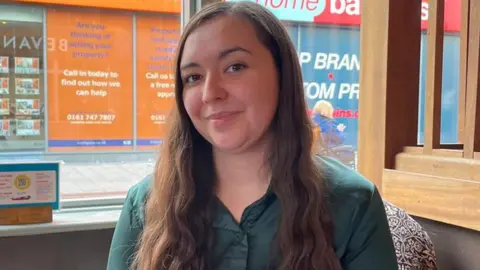Bank holds interest rates and warns it's too early to cut
 Getty Images
Getty ImagesThe UK economy is likely to see zero growth until 2025, while interest rates remain high for longer or rise further, the Bank of England has warned.
It came as the Bank left rates on hold for the second time in a row at 5.25%, the highest level in 15 years.
Rishi Sunak has pledged to get the UK growing by the end of the year, but the lower forecasts put this in doubt.
Despite the subdued outlook, Bank boss Andrew Bailey said it was "much too early to be thinking about rate cuts".
However, the Bank expects inflation - the pace at which prices rise - to fall sharply in the coming months.
This means the prime minister is on track to meet his promise to halve inflation to about 5% by the end of the year.
Up until September, the Bank of England had raised rates 14 times in a row to tame soaring inflation, which has been squeezing household budgets.
It has led to increases in mortgage payments, squeezing borrowers, but also resulting in higher savings rates.
"We will keep interest rates high enough for long enough to make sure we get inflation all the way back to the 2% target," said Mr Bailey.
"We'll be watching closely to see if further rate increases are needed."
The most recent inflation figure was 6.7% in the year to September.
The Bank expects it to continue to fall as energy and food price rises ease and predicts that it will remain at around 3% throughout next year, above the 2% target.
Mr Bailey told the BBC, however, that if the Israel-Hamas conflict spreads throughout the Middle East, it could have a knock-on effect on energy prices.
"It is a risk, clearly, that any sort of wider disturbance in the Middle East can obviously threaten energy prices, both oil and gas, and we watch that very carefully. So yes, we do see that as a risk going forwards."
But he said that the conflict - which he described as a "human tragedy" - had not resulted in much movement in energy prices yet, describing that as "obviously encouraging".
While the Bank is not predicting a recession, it expects zero growth from now, across the whole of next year - when there is likely to be a general election - and into 2025.
"UK economic growth is slowing," the Bank said.
Mr Bailey described the outlook for UK economic growth as "subdued" but he said that the situation was "not that unusual". Germany, which is Europe's biggest economy, has slipped in and out of recession.
"If you look at other countries, you're seeing pretty similar pictures quite frankly and one or two others are in recession at the moment," he said.
Chancellor Jeremy Hunt promised there would be measures to get Britain growing again when he unveils the government's plans to try and boost the economy in its Autumn Statement later this month.
"The Autumn Statement will set out how we will boost economic growth by unlocking private investment, getting more Brits back to work, and delivering a more productive British state."
But Labour said 13 years of "economic failure" had "left working people worse off", while the Liberal Democrats called the interest rates decision a "cold comfort for the millions of hard working families".
'Buying our first house seems further and further away'

Mortgage rates have shot up as the Bank of England has put up interest rates. That has affected first-time buyers, people remortgaging and those on variable and tracker deals.
In the UK, the rate on an average five-year, fixed-rate residential mortgage is 5.87%, down slightly from levels seen earlier this year but still high compared with a few years ago.
Ebony Cropper from Warrington and her fiancé are saving up for a deposit to buy their first home. But while they are budgeting hard, their rent went up an extra £45 a month in August making the job harder.
"We got engaged this year but then I think [the wedding] has got to wait because it's a big expense as it is for just one day and a house is more important," she told the BBC.
"It just feels a bit futile at the moment because your goal [of owning a home] is getting further and further away."
Although interest rates are currently on hold, there is more pain to come from the rate increases we've already seen, warned Dr Anna Valero, fellow at the London School of Economics and a member of the chancellor's economic advisory council.
"Because of the way monetary policy transmits through the economy there is this lag.
"Since we've had all these previous rate hikes, they still need to be felt - through people who will be renewing mortgages through next year, through businesses seeing increased borrowing costs and then all the implications [from that]," she told the BBC.

Ways to save money on your mortgage
1. Make overpayments. If you still have some time on a low fixed-rate deal, you might be able to pay more now to save later.
2. Move to an interest-only mortgage. It can keep your monthly payments affordable although you won't be paying off the debt accrued when purchasing your house.
3. Extend the life of your mortgage. The typical mortgage term is 25 years, but 30 and even 40-year terms are now available.

